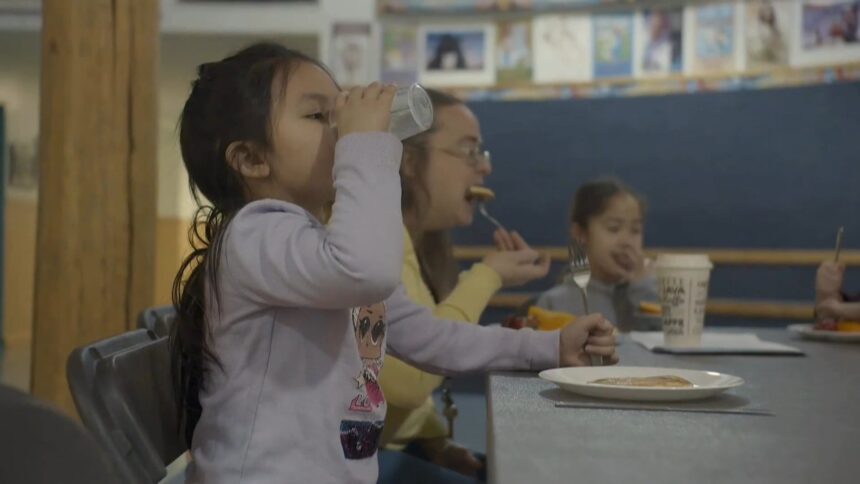A Yukon-based First Nations education advocacy organization says it was forced to axe its rural nutrition program after its Jordan’s Principle funding was cut — and warns the decision leaves Indigenous children struggling with food insecurity with even fewer supports. Melanie Bennett, executive director of the Yukon First Nation Education Directorate, or YFNED, said its rural nutrition program, which ran for the last five years and helped provide two healthy meals a day to 900 children from ages 0 to 18 across rural communities, including schools, daycares and family homes, is no longer operating. She said the loss of the program has been distressing for vulnerable families. “There’s grave concern,” she told APTN News. “I’ve had many (parents) contact me already and ask about ‘what are they going to do? Are there other options that they have? Where can they go?’” Bennett said the directorate had to end the program after Indigenous Services Canada (ISC) decided it no longer qualified for funding under Jordan’s Principle. The decision follows changes made to Jordan’s Principle earlier this year to tighten eligibility for non-urgent requests. But Bennett said the rural nutrition program is desperately needed and successfully provided nutritious food to children living in rural communities impacted by poverty, high food costs and a lack of supports and services. According to Bennett, ISC denied the program’s funding because it didn’t consider it to be the kind of extra support Jordan’s Principle is mandated to provide, instead determining it to be a temporary “bridge-funding” program meant to sustain rural children and families until they could access existing services and supports. Jordan’s Principle was created to prevent First Nations children from falling through jurisdictional cracks, as did Jordan River Anderson, a child from Norway House Cree Nation in Manitoba who had multiple disabilities. Jordan lived most of his life in a hospital because the federal and Manitoba governments were bickering over who should pay for his healthcare if he went home. He died in 2005 and never saw his home. The federal government runs the program to offer services to First Nations children on reserve that children living off reserve would receive. Jordan’s Principle expanded—under orders from the Canadian Human Rights Tribunal to cover a broader range of health and education needs and address systemic discrimination. For many children, it became a lifeline — filling gaps in food, housing, mental health, and other critical services. The government said skyrocketing costs forced them to rethink what services are offered. But Bennett argues ISC doesn’t understand the reality on the ground. “Not all the communities have food bank services. So, they’re very limited, especially the really remote ones. And the food bank service that does come is also limited. It only comes, I believe, monthly, and it’s nothing near what we were providing,” she said. Bennett said while the rural nutrition program has been terminated, its corresponding urban program hasn’t been impacted because it operates in a different funding cycle. She added that’s creating inequity between the programs. To keep things fair, the directorate is not offering its Christmas food hampers to either rural or urban families, a program meant to ensure children have nutritious food over the holidays. “I wear that heavy on my shoulders,” she said. She noted ISC’s decision also has her concerned for the future. “My prediction is that we will, in the rural communities, see a disengagement from school because (children) aren’t getting the food there that they would. And I just don’t want that to happen,” she said. National school food program raises issues, says directorate In 2024, the federal government launched the National School Food Program, investing $1 billion over five years to provide meals beyond those served by existing school food programs. The program aims to reach an additional 400,000 children per year. All provinces and territories have signed agreements with the government for the program. Earlier this year, the federal government transferred nearly $7.4 million to the territorial government as part of its agreement. Bennett said the Yukon government has approached the directorate to run the program. But she has concerns. She said the program won’t be ready until January at the earliest due to bureaucratic delays, it will only be rolled out across four of thirteen rural schools and the funding offered amounts to $1.44 per child per day. “That’s a granola bar and an apple,” she said. She also noted the national program is mandated to feed much more children than the rural nutrition program. “The $1.44 a day, it does that. It feeds more kids. Is it nutritional? Like good nutritional meals? Not quite. It’s not quite the same,” she said. Food security advocate criticizes funding cuts The directorate isn’t the only organization raising the alarm about the loss of the rural nutrition program. Sage Brown, coordinator for the Yukon Food Security Network, said rural communities and First Nations impacted by the program’s shutdown are reaching out almost daily to her organization for support. “It’s been really devastating to see that the impacts of these cuts on rural communities across the Yukon,” she said. Brown hopes to see the territory make significant investments into school food programs, similar to what British Columbia has done with provincial funding. “Food is a fundamental human right,” she said. Directorate to appeal funding decision ISC spokesperson Pascal Laplante said in a written statement the federal government “is committed to continuing collaboration with Indigenous partners to expand access to school food programs, ensuring that more children in Canada receive nutritious food at school.” He added Jordan’s Principle “is not intended to replace government income assistance or universal programs. It can support families with income supplements such as rent, groceries, or utilities as a temporary relief measure to address immediate risk factors to children.” “Each Jordan’s Principle request is considered on a case-by-case basis, along with the required documentation for the request, while taking into account the distinct needs and circumstances of the child/children.” Read More: Confusion followed Ottawa’s crackdown on Jordan’s Principle as costs topped $2B APTN reached out to the Yukon government for comment. A spokesperson said a statement was in the works, but didn’t provide it by deadline. Bennett said YFNED is in the process of appealing ISC’s decision. If denied, the directorate plans to launch a judicial review in the Federal Court of Appeal. She noted the directorate has the full support of the First Nations Child and Family Caring Society. “It’s about our kids. It’s as simple as that,” she said. “Having food and being well fed and healthy is core to success for our Indigenous children, not just in school, but success.” Continue Reading
Jordans Principle funding cut ends Yukon rural food program feeding Indigenous kids

Leave a Comment










